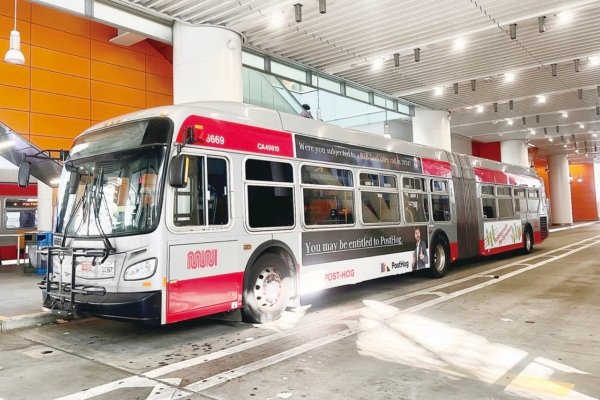In a press conference held online by the San Francisco Municipal Transportation Agency (SFMTA) on March 31, 2025, it was announced that the total number of passengers on the Muni public transport in 2024 increased by 13.5 million compared to 2023, reaching 75% of pre-COVID-19 levels. The ridership on some popular routes even exceeded pre-pandemic levels.
According to data from the SFMTA team, from April 2020 to December 2024, the overall number of passengers on the Muni continued to grow. In 2024, Muni served a total of 158 million passengers, an increase of 9.34% from the previous year.
The highest monthly recovery rate in 2024 was in September, reaching 78% of pre-pandemic levels from 2019; weekend recovery rates surpassed weekdays, both reaching their peak in September at 92% compared to pre-pandemic levels. The daily ridership on Muni also continued to rise in 2024, with average weekday ridership at 486,000 and weekend ridership at 318,000, increases of 46,000 and 17,000 respectively compared to 2023.
On weekdays in 2024, the passenger numbers on 7 routes exceeded the average level of 2019, with the 49-Van Ness-Mission line reaching 138% of pre-pandemic levels. During weekends, 13 routes reached or exceeded pre-pandemic levels, with the 22-Fillmore line performing most impressively at 150% of 2019 ridership.
SFMTA stressed that these data do not include the ridership on cable cars and streetcars as these routes do not have automatic passenger counters.
Brent Jones, Acting Director of the SFMTA Transportation Department, mentioned that the significant increase in Muni ridership in 2024 reflects San Francisco’s “strong economic recovery” and the public’s recognition of its services. He emphasized the agency’s commitment to enhancing service quality to attract more tourists and local residents to choose Muni as their primary mode of transportation.
SFMTA data also revealed that various events held in the city last year set new records for multiple routes, such as the “Sunset Night Market” on August 30, which led to the 7-Noriega line achieving its highest daily ridership record of the year, and the Portola Music Festival on September 28 driving the weekend ridership on the 15 line to its peak for the year.
The Mayor’s Office predicts that several factors will continue to drive up Muni ridership in the coming years. Companies like OpenAI and Databricks have announced plans to establish offices in Mission Bay and downtown, expecting thousands of employees to return to work in San Francisco. Additionally, the city will host multiple large conferences and sporting events in the next two years, including the 2026 World Cup and the 2025 Super Bowl LX, which are expected to attract hundreds of thousands of visitors.
“The increase in Muni ridership proves that people will use public transportation as long as we provide good service,” Mayor Wei said. “A prosperous San Francisco needs an affordable, reliable, and safe Muni system for commuters to arrive at work on time, for seniors to access medical care, and for parents to safely take their children to school.”
Muni not only plays a crucial role in the economic development of San Francisco but also serves as a vital mode of transportation for residents, students, commuters, and tourists. However, SFMTA is facing severe financial challenges.
Starting from July of this year, its budget deficit is projected to reach $50 million. By June 2026, after the exhaustion of federal and state pandemic relief funds, the deficit is estimated to increase to $320 million.
Since taking office, Mayor Wei has made adjustments to the SFMTA leadership team, appointing Acting Director Julie Kirschbaum as the permanent director and appointing Alfonso Felder, an executive from the San Francisco Giants, to the SFMTA Board of Directors. These actions aim to drive reforms within the transportation agency to proactively address the impending financial difficulties.
Mayor Wei, the SFMTA leadership, and the Muni Funding Working Group are collaborating to find short-term and long-term financial solutions. SFMTA has also developed new service and efficiency plans to reduce costs while ensuring the frequency and connectivity of Muni services.
Additionally, California Senators Scott Wiener and Jesse Arreguin, along with Mayor Wei and the SFMTA leadership, are working together to push for California legislation that will secure more state funding to ensure the sustainable development of the Bay Area’s transportation network.

